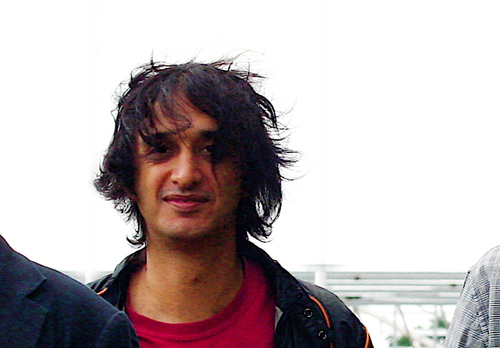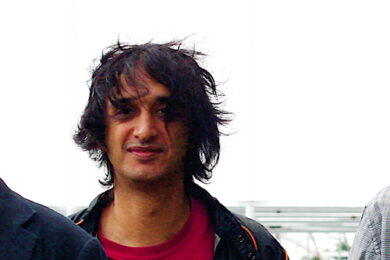1. You need interests outside the band.
I find it difficult to be solely inside the touring/recording cycle that is band life, even for a group like ADF which doesn’t really conform to the norm. So if anything comes along that can break the cycle while still helping the band I can’t resist.
2. Be aware of travel difficulties.
Don’t book a gig in Bulgaria that’s due to happen two days after you’re supposed to get back from Mozambique.
I’ve been working as a presenter on a new programme for Al Jazeera (English) called Music Of Resistance where we profile acts like Tinariwen and Seun Kuti on their home turf. In one episode we were profiling Massukos, a Mozambiqui band who write songs about washing your hands and how to build ecologically sound latrines in remote villages (more rock & roll than it sounds.) Only problem is this all takes place in Lichinga,which is known as the "Siberia of Mozambique" – i.e. it’s cold, grey, sparsely populated and full of exiled bureaucrats.
3. Never underestimate bureaucracy.
When we arrived at the capital Maputo we find that our reservations to get to Lichinga have mysteriously disappeared. "That’s OK, you can fly to Tete, it’s only a three-hour drive to Lichinga from there", we are informed. Later we are told it’s a six-hour drive, even later that it’s a 10 hour drive – as long as you get to the Malawian border before 6 pm. So, actually, what they mean is: it’s a 24 hour drive through Malawi. And when we finally get there we find they won’t sell us the air tickets out – and I have gig at a big Bulgarian festival in two days… I spend hundreds of pounds on my mobile organising another drive through Malawi and a flight via Kenya which will get me to Heathrow one hour before the flight to Bulgaria. In the end we get the flight out with five minutes to spare after an insane Kafka-in-Africa struggle with bureaucracy, and to top it all I’ve now got some extra white hairs.
4. Meet your heroes-as long as they happen to be Phillip K Dick fans.
I was asked by BBC Radio 4’s Today to put together a programme commemorating the death of possibly my biggest influence, the science-fiction writer Phillip K Dick. I was to interview people about his enduring influence and whether the world today resembles his vision in any way. The two people who were available were author Fay Weldon, who was a joy to speak to – and Mark E Smith. There is a dictum – don’t meet your heroes. Mark has a reputation as being one of the most difficult people to interview; the only time I ever see the word "cantankerous" is in relation to him. And this was the first time I had been the interviewer rather than interviewee. Of course the opposite was true. He was very friendly and we chatted for a long time, gleefully sticking the boot into Steven Spielberg. He even conceded a point to me that it is possible for a film to be better than the source novel; The Godfather was my knockout example (unbelievably bad book). I’ve never heard of Mark conceding anything to an interviewer, he’s more likely to chuck beer at them, which they probably deserve half the time anyway. I think I was at an advantage because he likes ADF and maybe also because I’m an anti-musician too.
5. Classical Orchestras do not understand rhythm.
I was placed in the surreal position of supposedly writing an opera for the English National Opera despite despising this form with a vengeance and having no knowledge of written music. It’s amazing where establishment-filtered political correctness can take you. I knew from the start this was just an exercise in getting lots of brown people to run around a posh institution so the boss can say "diversity" a lot in interviews. Maybe I should have thought twice about it but hey I was curious – and broke. Did I feel intimidated by these penguin suited purveyors of purism? Did I fuck. This orchestra could not play along to an electronic click, which to us in ADF is like not being able to walk. They were incapable of spontaneous creation and of having any emotional connection to the music they were playing. Every moment they were not playing they picked up a magazine. All fifty of them got up and walked out at one point because they couldn’t stand the dub bass sound. I’d rather die than relate to music in that way. It goes deeper,comrades. The intellectual elevation of harmony and melody above rhythm is a political act. It is one of the artistic foundations of colonial domination. I’m glad I pissed them off.
6. It is indeed possible to drive for 24 hours through the Malian desert with no sleep, be handed a huge joint on your arrival and then conduct your first ever professional TV interview in pidgin French.
This was my first interview for Al Jazeera, with the awe inspiring leader of Tinariwen, one Ibrahim Al Hagig. We were sat round a campfire in the middle of the desert and I was asking him questions in my very limited French. He understood me all right despite the the hash. Maybe it helped. Thing is I couldn’t understand his answers properly because my French isn’t good enough. But Ibrahim is one of those rare people who talks via his charisma so the vibe was brilliant. For me it’s the highlight of the series.
7. Even nomadic desert people like mobile phones.
On the aforementioned 24-hour drive across the desert I was fascinated by the innate sense of direction of our Touareg driver Houkay and his companion. I see one signpost the whole journey, and my Touareg companions take great delight in leaving the "National Highway" which is no more than a dirt track. In the middle of nowhere they will make sudden but minor shifts in orientation ,maybe 20 degrees north and then five degrees west. This continues even in the dark.How do they know where they’re going? There’s a theory that migrating birds are equipped with an internal global map from birth. Maybe we humans had that once too but most of us have lost it through urban living. That’s not to say the Touregs don’t embrace modernity, albeit selectively. During the few stops along the way, Houkay will run to the top of a hill, hold his mobile up to the heavens and shout out with great delight if he’s got a signal. Mobiles have revolutionised the nomadic way of life of the Touaregs, without threatening it; one of the few Western imports you can say that about. The mighty Tinariwen even refer to them in one of their songs as a celebration of Touareg achievements.
8. It is possible to start eating meat again after 17-years of vegetarianism.
During our trip across the Mali desert we’re driving in absolute darkness when Houkay spies a rabbit in his headlamps. They say something that may mean: "it’s a sign!" and proceed to run it over. We get out and Houkay puts the whimpering bunny out of its misery by cutting its throat. He skins the rabbit and builds a fire under the desert stars. I realise very quickly that it would be very rude not to partake in this moment. Food is very hard to come by in this region of the world; as I was often told the desert shows you nothing, you must find everything. So the very basics of life such as food and water take on a very deep spiritual significance; the rabbit is a gift from God and all should appreciate it. I tell them I haven’t eaten meat for seventeen years and that I will start again tonight thus turning the event into a unique desert ritual. I chew the rabbit with great trepidation and discover very quickly that it tastes… pretty horrible. In fact it tastes just like the tyres that ran it over, but that’s the not the point. It was still possibly the most fascinating meal I’ve ever had.



